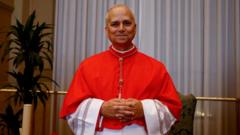Pope Francis has consistently opposed the Trump administration's deportation policies, a stance reflected in social media posts from Cardinal Robert Francis Prevost before he became pope. His criticisms not only targeted JD Vance's views but also echoed sentiments from other church leaders, raising moral questions around immigration practices under Trump.
Pope Francis Critiques Trump's Deportation Policies Through Social Media

Pope Francis Critiques Trump's Deportation Policies Through Social Media
Amid ongoing immigration debates, social media posts reveal Cardinal Prevost's past criticisms of Vice President JD Vance's interpretation of Catholic teachings supporting Trump's policies.
In a revealing exploration of immigration discourse, Cardinal Robert Francis Prevost, who has recently ascended to the papacy as the first American pope, has a history that reflects an inclination against harsh immigration policies supported by those in power. Long before his papal role, a social media account attributed to him shared critiques of U.S. Vice President JD Vance, highlighting that his interpretation of Christian doctrine relating to immigration was "wrong."
This social media account, active on the platform X, is noted for its posts that align with a broader discontent toward the Trump administration’s stance on immigration. One such post previously shared a compelling article by The National Catholic Reporter, which aggressively responded to Vance’s use of Catholic teaching to justify deportation policies — bringing forth an urgent moral inquiry about the treatment of migrants.
Moreover, the account relayed reflections from Catholic commentator Rocco Palmo, who questioned whether leaders, including Trump and El Salvador's President Nayib Bukele, truly considered the distress caused by their immigration reforms. He implored, “Is your conscience not disturbed?” Another notable post featured Cardinal Timothy M. Dolan, who labeled Trump's "anti-immigrant rhetoric" as "problematic," further indicating a united stance among various church leaders against the administration's troubling policies.
The situation intensified when the account also amplified criticism regarding the inhumane act of separating migrant families, a position endorsed by Cardinal Blase J. Cupich, who underscored the moral failings of such actions. These remarks are consonant with Pope Francis's broader advocacy for humane immigration policies, which he asserts must reflect the true Christian values of compassion and dignity.
Cardinal Prevost's account, dedicated to reposting insights from established church figures, resists offering his direct opinions, suggesting a careful navigation of the complexities surrounding American political discourse. However, that restraint did not prevent it from diving into contentious issues like racism and police violence, evidenced by a 2020 statement from seven American bishops who condemned the killing of George Floyd as a moral awakening.
Interestingly, despite this web of criticism, Trump appears unfazed, expressing eagerness to meet with the new pope. Vance, a convert to Catholicism who sought and received an audience with Pope Francis shortly before Prevost’s election, publicly congratulated the new pontiff via social media, wishing him success and invoking the support of American Catholics.
This evolving narrative in American politics illustrates a persistent conflict between the ideological stances of political leaders and the moral imperatives posited by religious authorities on issues of immigration. With Prevost now at the helm of the Church, vigilance will be essential in observing how these dialogues shape the intersection of faith and politics moving forward.























